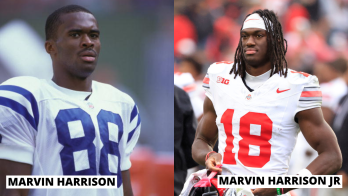
Source: Radio One / Radio One
This past Sunday De La Soul’s debut album 3 Feet High and Rising reached it’s 30 year anniversary. A moment to celebrate an influential album including huge records like “Me Myself and I” and “Potholes In My Lawn” became a reminder that the music industry values money over it’s artists and the effects can be severe. The iconic group visited Sway’s SiriusXM show Sway’s Universe to discuss the legacy of their music and how a bad deal has impacted the revenue they’ve received for the first six albums of their career. While Posdnuos, Trugoy and Maseo’s music gained critical acclaim from their debut in 1989 to their mid 2000s releases, fans that wanted to stream their music prior to their seventh album The Grind Date released in 2004 were out of luck. Tommy Boy Records didn’t properly clear the vast samples utilized in De La Soul’s first six albums. As the debt built up, legal issues led to the record label losing the Hip Hop collective’s catalogue to Warner Bros. Records.
In this streaming era, artists owning their music is essential to their ability to make money off their recorded history. For older artists like De La Soul who had to make the difficult decision of trading financial stability for creative freedom, their legacy gets losts in old cds and cassette tapes collecting dust in the basement. When an artist has a dedicated fanbase, touring can become the sole way to maintain a living but when your career reaches its prime, artists have to consider what happens when the crowds get smaller and their legacy is only celebrated every couple of decades and rarely gets compensated. While Tommy Boy Records managed to secure De La Soul’s catalogue in time to re-release 3 Feet High and Rising for it’s 30th anniversary, the trio still isn’t getting fairly paid for the success of their music. The New Yorkers took to Instagram to inform their fans that the group would receive 10% of sales from the 30th anniversary release while Tommy Boy raked up the benefits.
Since talking to Sway, the internet has joined the debate on #thephantom2milliondollardebt and the support for De La Soul has halted the re-release of 3 Feet High and Rising until both parties can come up with a resolution to an issue that has been cultivating for decades. With pressure from streaming services like Tidal and influential Hip Hop figures like Jay Z, Nas, Questlove and Joe Budden calling out the record label for it’s shady behavior, hopefully there’s a happy ending for De La Soul but we need a solution for the next veteran in the game that deserves to make a fair profit from the work they put into the world.
https://www.instagram.com/p/BuZj03QnB4F/?utm_source=ig_share_sheet&igshid=jnrqykzm07nc
As the tech community continues to champion bitcoin and blockchain technology as the future of currency, artists should look into utilizing blockchain to gain direct support from their fans and gain another stream of revenue. When artists don’t legally own the records they create or if they don’t have songwriting credits for their biggest hits then they miss out on a majority of money from the music. If they have the resources, artists can re-record their work and release it independently. We’ve seen recent success stories from artists like Jojo using that method but to avoid the record label red tape, artists of all eras need to find their power away from the gatekeepers of the music industry. When Hip Hop started in the 1970s it gave a voice to America’s minorities. Segments of the population that had to find the joy within the systematic oppression against them on a daily basis. Today Hip Hop is the biggest genre in the world, the culture that was built from the music of the OGs is mainstream and everyone wants a piece of the lucrative cake but the first people that should be served should be the founders of the culture.
How Artists Can Utilize Blockchain Technology:
- Connect directly to fans with smart contracts and peer-to-peer transactions do your base can directly support your music
- Utilize music blockchain streaming startups like Musiccoin and Revelator which allow musicians, publishers and record labels to monitor copyrights and revenue streams. Peertracks is another solid alternative offering 90% of instant revenue from sales
- Give fans exclusive content that can be purchased with cryptocurrency as a way to promote the growth of the digital currency and control another stream of income
Article By: Marcel “The Messenger” Jeremiah












